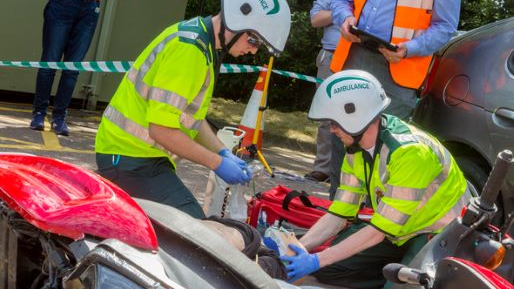Cameron - Typical day on Placement

A typical day on placement: Paramedic Science
The placement by far is the best part of any health course. It’s a look into the career you work so hard to achieve. This is a look into a 12-hour shift I undertook, starting at 06:00.
I wake up at 04:30, make some breakfast and put my food for the day in my bag then set off. I aim to set off at about 05:00. About 30 to 45 minutes later, I arrive at the station. The first thing I do is make a pot of coffee, sort out my bags and equipment then go to the ambulance. I then check the ambulance to make sure everything is working mechanically and make sure that we have all the equipment we need. Usually, my crew have arrived by now, taken out the medication and helped load equipment onto the ambulance. We aim to be ready to start by 06:10.
We normally get the first job once we become available. The jobs that we usually receive range from chest pains to minor injuries, to falls and social emergencies. When people say that the ambulance goes to everything and anything, it’s an understatement. You meet hundreds of different people with different ways of life, different views on the world and interesting life stories. Some people are having a minor emergency, where things work slower and more calmly and some are having a major emergency, where quick decisions make all the difference to someone’s outcome. Some patients you can leave at home with advice or you may refer some to their GP. Each job is different and can have wildly different outcomes.
With each patient, you get a lot of power to do assessments and make decisions. Generally, you make most of the decisions and treatment plans and procedures within your scope. There is, however, a slight caveat. Much like a rollercoaster gives you the feeling of danger while you are relatively safe, your mentor is watching everything you do, and will overrule any decision you make if it goes against their plan of action. It’s a strange sense of freedom and safety. A good mentor will give you enough room to make mistakes, but not enough to cause harm by doing so.
The amount of responsibilities you have in each ambulance varies by the crew. Some will ask you to do all the monitoring, some will ask you to attend each patient (attending a patient is taking the responsibility for the outcome and doing the paperwork). It varies by who you work with at any given time.
An average day will have five to seven patients, each with varying levels of sickness. The days are long but go by quickly as you are always busy. Breaks are a rarity on ambulances, you eat your food on the way to patients. Although the average “job time” is an hour and a half, it can be much longer depending on the situation. I think my personal longest is five to six hours, although there are others with much longer times.
At the end of the day, you return to the station, empty out the truck and go home. It’s quite a quick process depending on how much you have. Once back home I make food for the next day, defrost some dinner I made earlier in the week, eat, shower, sleep and repeat.